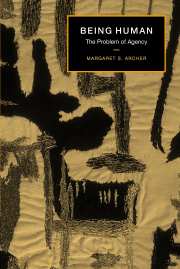Book contents
- Frontmatter
- Contents
- List of figures
- Acknowledgements
- Introduction
- Part I The impoverishment of humanity
- 1 Resisting the dissolution of humanity
- 2 Modernity's man
- 3 Society's being: humanity as the gift of society
- Part II The emergence of self-consciousness
- Part III The emergence of personal identity
- Part IV The emergence of social identity
- Conclusion: the re-emergence of humanity
- Index
3 - Society's being: humanity as the gift of society
Published online by Cambridge University Press: 22 September 2009
- Frontmatter
- Contents
- List of figures
- Acknowledgements
- Introduction
- Part I The impoverishment of humanity
- 1 Resisting the dissolution of humanity
- 2 Modernity's man
- 3 Society's being: humanity as the gift of society
- Part II The emergence of self-consciousness
- Part III The emergence of personal identity
- Part IV The emergence of social identity
- Conclusion: the re-emergence of humanity
- Index
Summary
Amongst those who have resisted the postmodernist ‘dissolution’ of humanity, there is no consensus about how the human being should be conceptualised: no agreement about the properties and powers of humans and no accord about where these come from. The ‘great divide’ is between those just examined, who present our most important power as our rationality, which is treated as pre-given in the individual, who is portrayed so atomistically that nothing about him or her is in any sense owing to society. On the contrary, society itself is the aggregate consequence of the actions of these instrumentally rational individuals. In short, social structure is derived from agency and the macroscopic from the microscopic. This is why ‘Modernity's Man’ is a straightforward version of Upwards conflation: all properties of society can be derived from the doings of this rational man, along with others like him. Symmetrically, no properties of this individual are derivative from his or her social context – a proposition which was challenged in various ways in the last chapter.
Opposing ‘Modernity's Man’ stands ‘Society's Being’. This presents all our human properties and powers, beyond those stemming from our biological constitution, as derivative from society. The human power most vaunted here is our ability to manipulate meanings, and thus to act meaningfully: to understand what a human being does, it is necessary to grasp the meanings informing his or her activities.
- Type
- Chapter
- Information
- Being HumanThe Problem of Agency, pp. 86 - 118Publisher: Cambridge University PressPrint publication year: 2000



